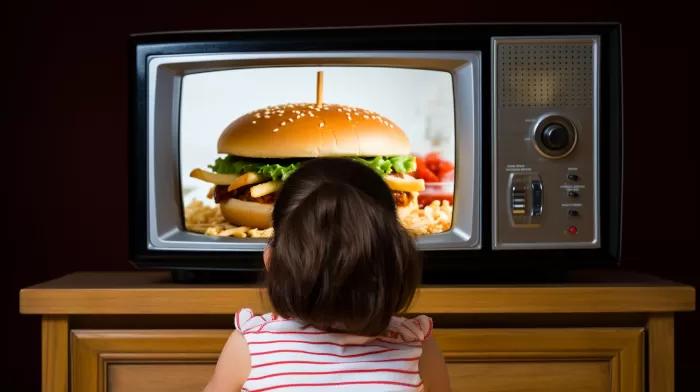Children’s eating habits are greatly influenced by the television commercials they watch, which often lead them to crave sugary, fatty, or salty foods. According to a study conducted at the Institute of Psychology, Health and Society in the U.K., children who watched commercials for fast food or unhealthy snacks before a cartoon were more likely to choose such foods after their program.
The Global Connection Between Advertising, Food Preferences, and Consumption
The results of this study are essential, as obesity in young children has become a major health concern worldwide. It highlights the global connections between advertising, food preferences, and consumption. Researcher Emma Boyland stated that the effect of commercials on kids goes beyond a branding preference since the children were shown to have an overall preference for unhealthy food.
The study’s findings suggest that kids who watch a lot of television are more likely to become overweight or obese, compared to their peers who choose to do other activities. Children who watched more than 21 hours of TV weekly were found to be more susceptible to the advertisements and had a higher body mass index than other children.
Commercials’ Impact on Children’s Food Choices
The impact of commercials on children’s food choices is enormous, as they are highly receptive to advertising messages. For example, characters in TV ads can create positive associations with unhealthy products, making them more appealing to children.
A report published by the World Health Organization demonstrated that food marketing influences children’s food preferences and purchase requests, ultimately leading to unfavorable diets and the risk of obesity.
The Pester Power Phenomenon
Since young children lack the understanding of nutrient content and the concept of healthy eating, they are often driven by taste preferences and visual appeal influenced by advertisements. This results in increased “pester power,” where children repeatedly ask for unhealthy, heavily advertised products.
As their advertisements are predominantly tailored to younger audiences, multinational food and beverage companies are now under scrutiny for their contribution to the childhood obesity epidemic. According to a report by the United Nations, pester power is one of the main reasons for the upsurge of obesity among children.
Addressing the Issue: Should Advertisements Be Regulated?
Considering the unhealthy influence of such advertisements on children’s food preferences, should governments introduce stricter regulations on the marketing of unhealthy products to kids?
The World Health Organization (WHO) issued a set of recommendations urging member states to restrict food marketing to children. By reducing children’s exposure to unhealthy food commercials, governments have the potential to encourage healthier eating habits and combat the childhood obesity epidemic.
In addition to these guidelines, parents and caregivers should be more vigilant about what their children watch and consume. Parental monitoring and guidance can significantly reduce exposure to harmful commercials. Encouraging outdoor activities, offering healthier food options, and limiting television viewing time are crucial steps to promote a healthier lifestyle and counteract the negative effects of commercials on children’s eating habits.
Final Thoughts
The findings of the study conducted in the U.K. confirm the suspicions of many parents – television commercials greatly influence a child’s choice of food. As a result, addressing the impact of commercials on children’s eating habits becomes an urgent concern for various stakeholders.
By introducing stricter regulations regarding food marketing to children, encouraging healthier eating habits, and increasing parental monitoring and guidance, societies can counteract the negative influence of television commercials on children’s health.
It is essential for parents, caregivers and governments to play a proactive role in establishing a healthy environment for our future generations. By adopting a holistic approach that deals with the issue on multiple fronts, we can ensure that children develop better eating habits and understand the importance of a healthy lifestyle.



